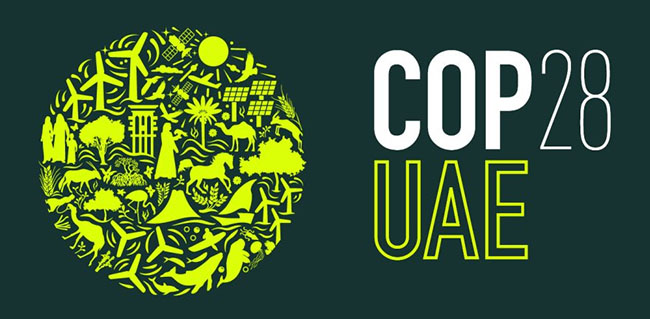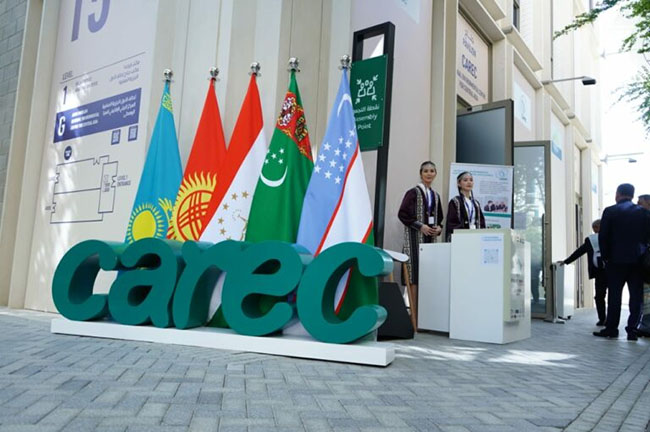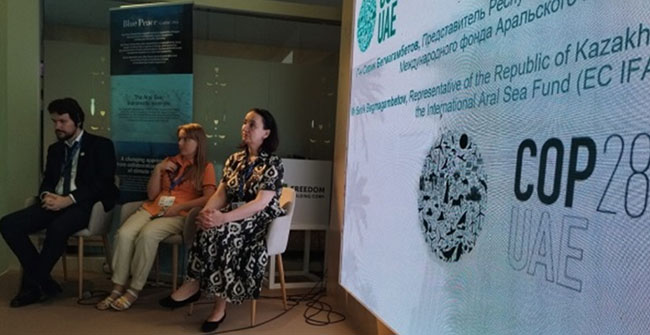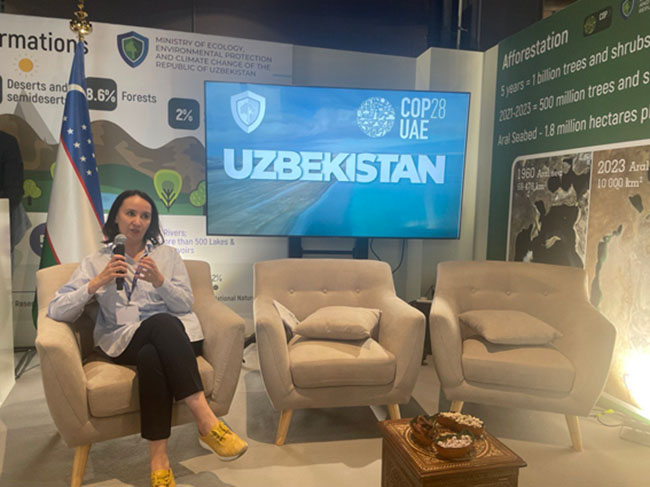THE 28th CONFERENCE OF THE PARTIES TO THE UN FRAMEWORK CONVENTION ON CLIMATE CHANGE
The 28th meeting of the Conference of the Parties to UNFCCC (COP28) was held in Dubai, UAE from 30 November to 12 December 2023.

About 100,000 participants have registered to this summit. This is more than for other past COPs. Dubai invited over 200 countries, and heads of state and prime ministers from 167 countries confirmed their participation.
UAE chaired COP28. They applied an inclusive approach in the course of preparation to the summit. For the first time in COP, open consultations were organized on topic areas and actions sequence. Multiple stakeholders involved in this process included governments, business, civil society, youth, indigenous people and others. They helped to identify most relevant focus areas for COP28.
The Central Asian countries were represented at highest level. All country leaders from the region took part at COP28. Tajikistan, Uzbekistan and Central Asia pavilions were organized to hold different thematic discussions.
Yet, water is not in the focus of the conference and has to be integrated into all dimensions of climate actions, from adaptation to mitigation. Nevertheless, multiple events were organized on water issues, including by Central Asian countries. Unfortunately, the water pavilion was not clearly marked on the conference maps and was located far away from plenary halls inside the Food and Health block, which made it difficult to find. However, thanks to joint efforts of Tajikistan, the Netherlands and UAE, water was mentioned in COP28 final documents.
The agenda included new areas, such as health, trade, aid, reconstruction and peace. It also included four cross-cutting themes for effective and interconnected action: technology and innovation, inclusivity, communities on the frontlines of climate action, and finance.
Among the key topics of COP28 were the aid to poor countries, adaptation to hotter climate, further decarbonization of energy sector, and progress on climate goals in the form of a Global inventory of the Paris Agreement.
A joint Central Asia Pavilion “5 countries – 1 region – 1 voice” was organized at COP28. The thematic content of the Pavilion complied with the principle of parity of the participating countries and followed the theme of the UNFCCC COP28. They are decarbonization of the economy, development of the green finance system, carbon markets, biodiversity conservation, and adaptation to climate change.

At the venues provided by the Central Asia Pavilion, Kazakhstan, Kyrgyzstan, Tajikistan, Turkmenistan and Uzbekistan presented their achievements, results, and prospects on a single platform. Over 21 years of joint work, the countries of Central Asia have accumulated great potential in environmental legislation, strategic planning and the introduction of innovative technologies, which is an advantage of the region.
Central Asia voiced two regional statements in Dubai: on behalf of the governments of Central Asian countries and on behalf of NGOs and youth of Central Asia. The regional statements emphasized the extreme vulnerability of the region to climate change, and its adverse effects on ecosystems, national economies, and public health. At the same time, the region has a high potential for testing innovative technologies, methods, and approaches to increase climate change resilience and fulfill the Paris Agreement objectives.
SIC ICWC took part in several events organized at the venue of the Central Asia Pavilion, including:
- Presentation of the Regional Strategy for Adaptation to Climate Change in Central Asia
- Team Europe Initiative on Water, Energy and Climate Change in Central Asia
- Exploring Pathways to Investments in Nexus Projects for Enhanced Transboundary Cooperation in Central Asia

A session dedicated to restoration of Aral Sea ecosystems, organized by the Ministry of Ecology and Environmental Protection and the Multi-Partner Trust Fund for the Aral Sea Region (2 December). Speakers reported on hard efforts made for afforestation and monitoring of the dried seabed. The International Innovation Center for the Aral Sea region presented projects implemented in this area and emphasized the need to create a Geo-information Portal of the dried seabed, which would accumulate all data from ground expeditions carried out jointly by SIC ICWC and UNDP, as well as RS-based data.
A session on the role of science in promotion of climate agenda (6 December), where Prof. Z. Novitskiy, D. Ziganshina, and A. Gafurov reported. Prof. Novitskiy made a comprehensive presentation on all stages of the afforestation effort, achievements and difficulties.

|